Open innovation
We solve problems with market innovators
Our Open Innovation team works globally with market innovators large and small to solve London's most pressing challenges.
Our new 'Tap In for Innovation' process is TfL's main entry point for innovations, ideas and platforms that can help to address the complex problems TfL and its millions of customers face. This process is key to ensuring all innovators receive an equal opportunity to go through our innovation discovery process.
How does the 'Tap In for Innovation' process work?
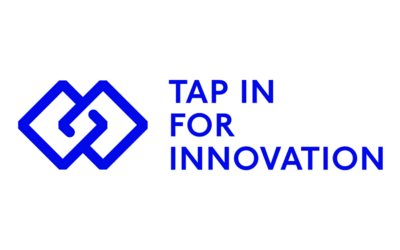
1. Submit
Submit your idea, solution or platform through the 'Tap In' form. After submitting, you will receive a confirmation via email.
2. Review
Entry is reviewed by the Open Innovation team and subject matter experts. Meetings happen at least once every month.
3. Decision
Decision to progress application is shared with applicant. Successful applicants will be invited to make a 30 minute pitch to TfL.
4. Next Steps
Successful pitches may lead to further discovery work or trialling. If your submission meets basic checks, you will be added to our Tap In database for future innovation opportunities.
Entire process from submission to decision takes up to 1 month.
TfL's core innovation focus areas for 2024/25
Recent opportunities
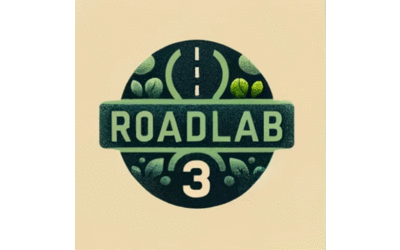
RoadLab 3: Sustainability across our roadworks and road network
We have issued a Market Sounding Questionnaire (MSQ) ahead of a potential funded competition to engage with the market to:
- Understand what solutions exist that could improve sustainability across TfL's road network
- Understand what technologies and processes exist in other cities, locations and industries that might be applicable to road network in London
- Gauge suppliers' interest, capabilities, and capacity to engage in a potential future trial
We're interested in learning about all solutions that could improve sustainability in roadworks, however there are two problem statements that this challenge will focus on:
- Reducing carbon impact in roadwork maintenance activities
- Improving drainage to deal with surface water flooding
This MSQ closed in September 2024 and we are currently reviewing responses. If interested in any future opportunities in this area, please reach out via Tap In process above.
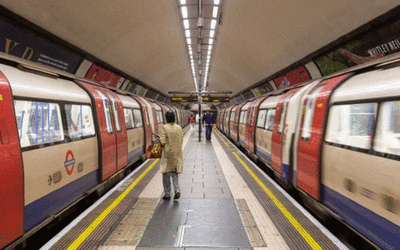
Platform train interface MSQ
We have issued an MSQ ahead of a potential funded competition to get feedback on potential solutions to reduce the risk of falls, accidents on the track and falls or accidents between the platform and train, as well as how we might reduce potential consequences of such incidents in the event they do occur.
The primary focus is to gauge market interest and capacity to solve this problem and to gather market feedback on risks and opportunities in relation to the manufacture and supply of solutions.
How might TfL:
- Eliminate or reduce the risk of falls on the track and falls between the train and the platform?;
- Eliminate or reduce of incidents caused by objects or people getting trapped in the doors?
- Reduce the potential consequences of such incidents if they do occur?
This MSQ closed in October 2024 and we are currently reviewing responses. If interested in any future opportunities in this area, please reach out via Tap In process above.
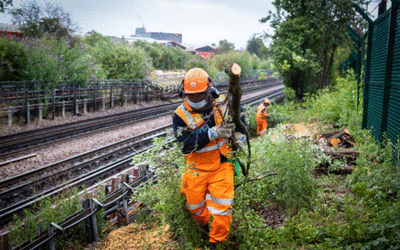
Rail Adhesion MSQ
We have issued an MSQ ahead of a potential funded competition to get feedback on potential solutions to obtain market feedback in relation to rolling-stock mounted solutions for improving conditions of railhead adhesion. Principally, the solution should be adept at removing railhead contaminant originating from leaf matter getting crushed on the rail to alleviate the conditions of low adhesion caused by it. The primary focus is to better understand market/supplier appetite, capacity and capability, as well as perceived risks and opportunities.
The objectives are to:
- Explore what additional solutions exist that could mitigate the impact of railhead contamination.
- Understand what technologies and processes exist in other cities, locations and industries that might be applicable to our network in London.
- Gauge suppliers' interest, capabilities, and capacity to engage in a potential future trial.
- Identify information on possible solutions for improving railhead contamination, including railhead cleaning methods.
This MSQ closed in October 2024 and we are currently reviewing responses. If interested in any future opportunities in this area, please reach out via Tap In process above.
How Open Innovation works at TfL
We work with innovators of all sizes to solve TfL's challenges. Rather then prescribing solutions, we instead look to the market for creative, resourceful and novel approaches to our problems. Innovating with the market lets us solve problems quickly and more cost-effectively, improving our network and making life better for Londoners.
In all cases, whether we're carrying out horizon scanning or running a live challenge, we're focussed on mobility innovations that will further the aims of the Mayor's Transport Strategy and exemplify TfL's values of being open, caring and adaptable.
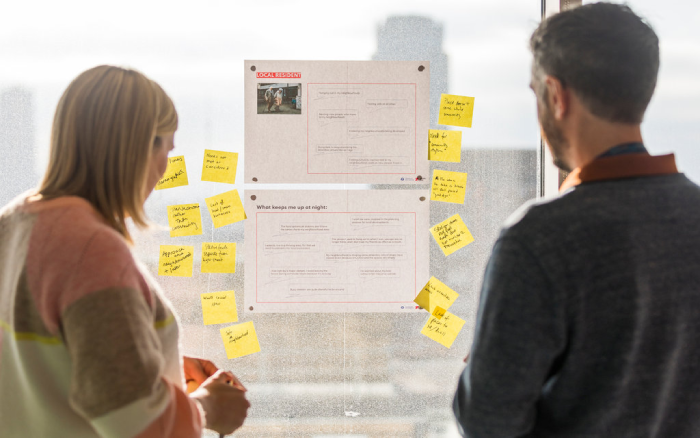
Innovation Collaboration Framework
Our transformative strategic Innovation Collaboration Framework (ICF) was launched in 2024 after a competitive process and represents a new route to market for co-developing innovative products. This partnership will allow us to harness the world leading innovation capabilities of our two partners, Mercedes Benz and Sopra Steria.
We will work with our partners to co-develop solutions that solve our most challenging problems. The Framework terms allow us to draw on R&D funding from our partners to finance trials of proof of concepts and gives us the opportunity to access our partners' innovation ecosystems as well co-commercialise co-created products.
We're excited to see how our ICF innovation partners can collaborate with us to deliver our strategic objectives and drive innovation in our city.
Work with our digital partners
We have partnered with Google to deliver Google Street View for some of our busiest and most complex stations. This will help customers to better pre plan routes through our station and will be especially helpful to our customers with accessibility needs and those unfamiliar with our network such as tourists.
Industry research shows us that over 80% of customers with a mobility requirement would find in-station maps useful, and finding exits or onward travel are commonly reported challenges.
Open Innovation at work in London
TfL's Open Innovation team works with our 28,000 staff and globally with innovators and the marketplace to bring improvements to our network, customers and business. Here are some case studies which showcase the work we have done to support the goals of the Mayor's Transport Strategy.
Case Studies
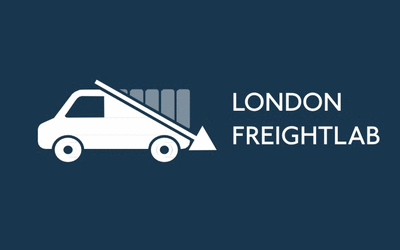
London FreightLab
Working in collaboration with the GLA, TfL partnered with key freight operators and servicing partners to trial and test a number of innovators in order to reduce the adverse impact of freight in London. A number of trials were conducted across different contributors:
- Focus on monitoring and predictive analysis of kerbside behaviours
- Last-mile delivery modes using e-assist cargo bikes
- Real-time emissions monitoring loading bays across partner sites
- Monitoring and reducing particulate matter pollution caused by tyres
- Utilising visual analytics on HGV dashcams to identify hotspots on key delivery routes.
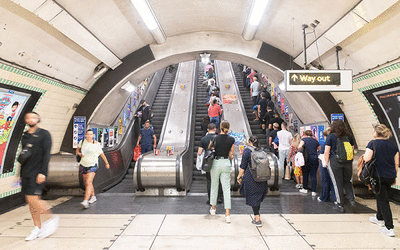
Preventing injuries on escalators
Working with innovators and escalator operators to find newer, safer ways for children to use escalators across TfL's network.
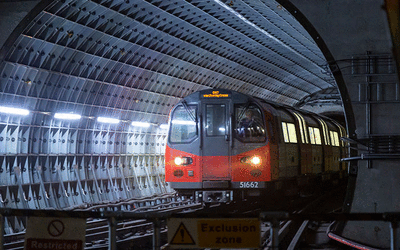
Investigating ways to improve air quality on the Tube
Although we meet legal requirements, we have been looking for ways to reduce the airborne particulate matter in the air across our London Underground network.
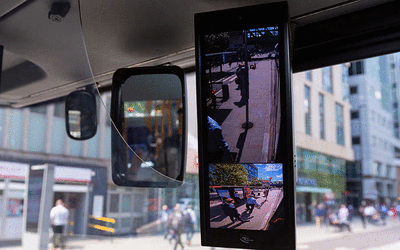
Ending violence against women and girls
Working with innovators and tech companies to determine how might we combine emerging innovations with existing on-bus technology to identify and act upon behaviours that make women and girls feel unsafe when using the bus.
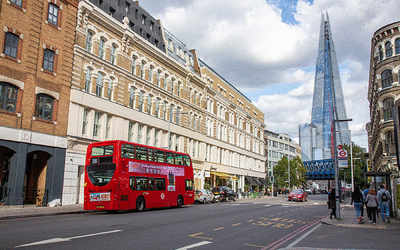
Redesigning bus stops & shelters
We're looking at how bus stop and shelter design can be upgraded for the future especially by increasing safety, wellness, sustainability and longevity.
Vehicle as a Sensor
Vehicles on London's roads are increasingly connected and equipped with advanced sensors, including private cars, trucks, and bicycles. The Open Innovation team has been exploring the application of this vehicle sensor data to a range of use cases, including safety and delivery planning, to learn where it could improve our decision-making.
Bosch
TfL and Bosch have outlined how our innovative partnership has helped improve transport in the capital, with work including the use of AI to improve road safety, new approaches to tackling Tube noise, optimising traffic signalling and greater insight of how smoothing traffic flow can improve air quality.
Quantum Horizon Scan
An exploration of the threats and opportunities quantum technology poses to the transportation sector, along with where the first use cases will be realised and how TfL can better prepare to take advantage of this fast developing area.